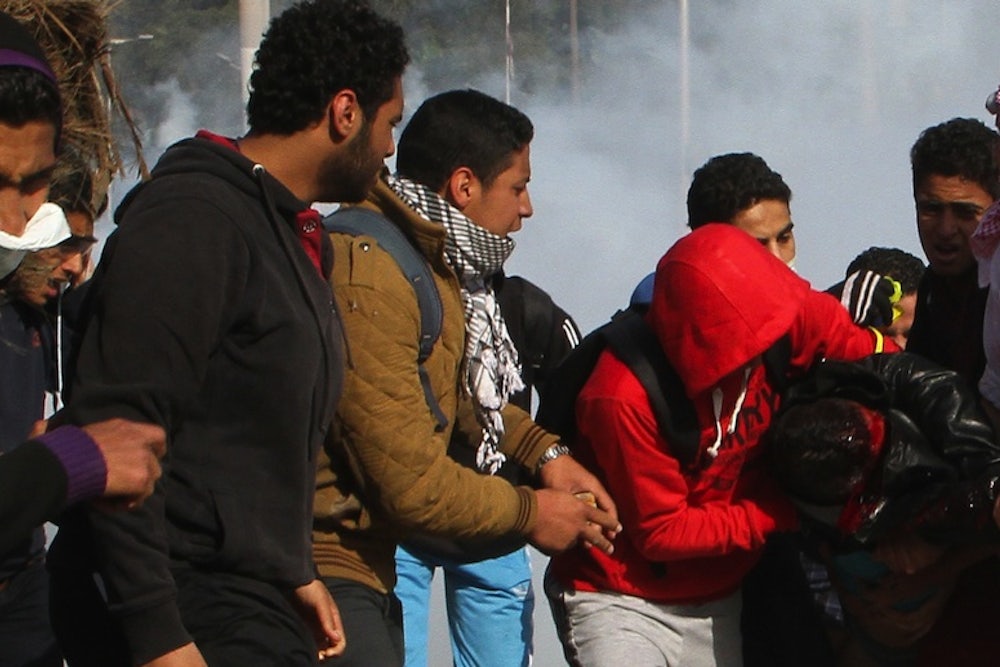Earlier this week, when the Egyptian government sentenced 529 members of the Muslim Brotherhood to death in a case in which a single police officer had been killed, condemnation was swift and justified. “It defies logic,” said U.S. State Department Spokeswoman Marie Harf, noting that all those people had been tried in just two days. Additionally, the verdict was reached without the presentation of any evidence linking any of those accused to the crime. It’s a window into the byzantine Egyptian justice system, where injustices are rife: Since the military ousted Mohamed Morsi from the presidency last summer, 16,000 of his supporters have been detained in deplorable conditions in police stations and prisons across the country.
Some of these detainees, particularly journalists and secular activists, have generated public support and outrage. But the vast majority are ordinary members or supporters of the Muslim Brotherhood, and the rest of the country seems resigned to, or even approve of, their indefinite detention.
“Every time I have a cup of tea, every time I have something to eat, I wonder, what is he eating right now?” says a family member of Khaled Qazzaz, a former aide to Morsi who has been detained since last July.For months there was no legal record of Qazzaz’s detention. It was two weeks before his family learned where he was. After three months the authorities granted his family permission to visit. On December 17, he was formally arrested. At that time, news reports falsely claimed that he and two others’ arrests had been recent. They had already been in detention for over five months.When a family member brought Qazzaz’s one-and-a-half-year-old daughter, Tahrir (named after the square that once stood for freedom for so many Egyptians), to visit her father in prison, she didn’t recognize him. He has been behind bars for a third of her young life. “It was heart-breaking,” his relative said.
Thousands of families have been affected similarly by the crackdown, which has grown beyond the Muslim Brotherhood to target activists, journalists and other who express dissent. Those who have made it to trial have been have been charged with membership in a banned organization, violating the protest law, attacking public property, and disturbing public order, among other things; but most have yet to be charged.
Qazzaz is now being held in Egypt’s Tora prison in the maximum-security wing called “the Scorpion” in a cell two meters long by two and a half meters wide. He has been detained for almost nine months without charge.In Egyptian prisons, detainees rely on family members to bring them everything, from fresh clothes to food to medication to clean drinking water. Those who have been released from prison report that prisoners whose families do not bring them provisions will often perform odd jobs for other prisoners in exchange for food. On January 25 prison guards confiscated everything that Qazzaz’s family had brought him, leaving only the clothes he was wearing and a blanket. A month ago prison officials announced there would be no visits to political prisoners for a month. His relative says they don’t know if he is getting his medication or even clean water. Cells are insect-infested and very cold.
Horrendous conditions in police custody are not new in Egypt. Police brutality and the death in detention of activist Khalid Saeed in June 2010 helped fuel the 2011 uprisings against Hosni Mubarak. Reports of beatings and torture are common.Under repressive governments across the region, such incidents are commonplace. There is an Arabic literary genre called “prison literature” written by artists and dissidents about their time in detention. It is as rich and varied as the region itself. There are Yemeni versions, and Egyptian, Syrian and Libyan, dating back to colonial times.These days, conditions in Egypt are particularly bad. Detainees report an attitude of retribution for the humiliation and defeat the police felt after they were chased off the streets in January of 2011. “You have state institutions that have decided to take up the idea of final revenge,” said Emad Mubarak, Executive Director of the Association of Freedom of Thought and Expression.Students, journalists, former government ministers, doctors, professors, shopkeepers—all are represented inside Egypt’s prisons and police stations. Some of the detainees are under 18. Rights groups report that over 300 children have been detained in the past seven months. In some cases, police have been known to detain family members to pressure people to turn themselves in. “This is a normal thing…to take the father to get to the son” Mubarak said.
Lawyers have trouble gaining access to state security camps where some protesters are being held. Many have been tried without lawyers present. The prosecution is completely overwhelmed and hundreds of people often face the same blanket charges. Ragia Omran, human rights attorney and member of the Council for Human Rights, called on government to implement the new constitution, including the right to a lawyer.Last August U.S. Secretary of State John Kerry said that the Egyptian army was “restoring democracy” when it ousted Muslim Brotherhood president Mohamed Morsi the month before. In November, he said the democratic roadmap was "being carried out to the best of our conceptions." But what is the significance of a democratic roadmap when 16,000 members of the opposition are in jail?
